Artykuł w angielskim wydaniu saudyjskiego miesięcznika „Al-Majallah” poświęcony jest arabskim Izraelczykom, którzy służą w Izraelskich Siłach Obronnych (IDF). Długi artykuł Suzan Quitaz, kurdyjsko-szwedzkiej dziennikarki i badaczki specjalizującej się w izraelskiej polityce i regionie Zatoki Perskiej, zauważa, że liczba muzułmańskich i chrześcijańskich Arabów służących w IDF wzrasta dzięki skutecznym metodom rekrutacji i działania IDF.
Rozpatrując temat z bardzo pozytywnej perspektywy, artykuł zaczyna się od odnotowania, że w przeciwieństwie do błędnego przekonania panującego w mediach, IDF nie jest w przeważającej mierze żydowska, ale jest „armią ludową”, która składa się z członków ze wszystkich sektorów społeczeństwa izraelskiego, w tym wielu arabskich żołnierzy, Druzów, muzułmanów i chrześcijan, którzy służą na wszystkich poziomach wraz ze swoimi żydowskimi towarzyszami. Zauważa, że społeczność Druzów w rzeczywistości ma najwyższy wskaźnik zaciągu w całym społeczeństwie izraelskim, w tym w sektorze żydowskim, i że służba w wojsku od dawna jest częścią tożsamości izraelskich Druzów i źródłem ich dumy. Cytowany w artykule młody Druz stwierdza, że podczas służby nigdy nie był traktowany inaczej niż jego żydowscy koledzy-żołnierze. „Wręcz przeciwnie, IDF jest jedną z niewielu instytucji, gdzie wszyscy są traktowani równo i sprawiedliwie” – powiedział.
W artykule zauważono, że także w innych społecznościach izraelsko-arabskich, a zwłaszcza wśród Beduinów w północnym Izraelu, liczba rekrutów rośnie w ostatnich latach. Przedstawia komentarze wielu arabskich żołnierzy i byłych żołnierzy, którzy twierdzą, że ich poczucie przynależności i chęć służenia ojczyźnie sprawiły, że dołączyli do IDF. Wyrażają również opinię, że służba wojskowa przyczyniła się do ich rozwoju osobistego i zawodowego oraz że jest jedną z bram do równości w izraelskim społeczeństwie. Artykuł przedstawia historię młodej Arabki, która łamiąc normy swojego arabskiego społeczeństwa, zaciągnęła się do IDF i jest dziś wysokiej rangi oficerem. Początkowo wstąpiła do wojska bez wiedzy rodziców, ale dziś są oni dumni z jej kariery wojskowej, podobnie jak ona.
Artykuł podkreśla, że sukces IDF w rekrutowaniu coraz większej liczby izraelskich Arabów wynika w dużej mierze z efektywnego mechanizmu rekrutacji, a konkretnie dzięki wysiłkom jednostki IDF odpowiedzialnej za rekrutację mniejszości, która posiada pododdziały specjalizujące się w określonych grupach mniejszościowych. Starszy oficer w tej jednostce wyjaśnia, że dociera ona do młodych Arabów poprzez szkoły i domy kultury, a dziś także poprzez media społecznościowe i osobiście docierając do potencjalnych rekrutów. Dodaje, że jednostka zapewnia każdemu rekrutowi wsparcie i zapewnia taki sam postęp zawodowy, jak każdemu innemu nowemu rekrutowi. „Młodzi Arabowie izraelscy są bardziej świadomi tego, czym jest IDF i co może im zaoferować, jeśli chodzi o możliwości kariery w samej armii lub dalszą edukację [w] życiu po wojsku”, mówi.
Artykuł przyznaje, że służba w IDF jest nadal bardzo kontrowersyjna wśród izraelskich Arabów i że wielu zaciekle się temu sprzeciwia. Cytuje byłą izraelską parlamentarzystkę arabską, Hanin Zoabie, która twierdzi, że arabscy żołnierze w IDF nie cieszą się równością i wstępują do armii tylko dlatego, że są biedni i bezrobotni. Twierdzi dalej, że Izrael rekrutuje ich z powodów politycznych, aby siać podział wśród izraelskich Arabów. Odpowiadając na te twierdzenia, Hassan Kaabia, izraelski Arab i były podpułkownik, który służył w IDF przez ponad dwadzieścia lat, stwierdza, że „IDF jest jedyną instytucją, w której nie ma dyskryminacji i panuje całkowita równość i integracja. Nieprawdą jest, że przystępują ze względu na czynniki ekonomiczne. Większość izraelskich Arabów, którzy wstępują do armii, robią to z jednego powodu, a jest nim to, że chcą być częścią państwa”. Kaabia dodał także zgryźliwie, że jeden z bliskich krewnych Zoabie odbył służbę w IDF.
Artykuł kończy się uwagami oficera jednostki odpowiedzialnej za rekrutację mniejszości, który stwierdza: „Izrael jest wielowyznaniowym i kulturowym społeczeństwem z wieloma mniejszościami. IDF może być świetną platformą do połączenia nas wszystkich z naszą ojczyzną, Izraelem”.
[Dalszy tekst – fragmenty artykułu opublikowanego w „Al-Majallah”[1] – nie jest spolszczony]
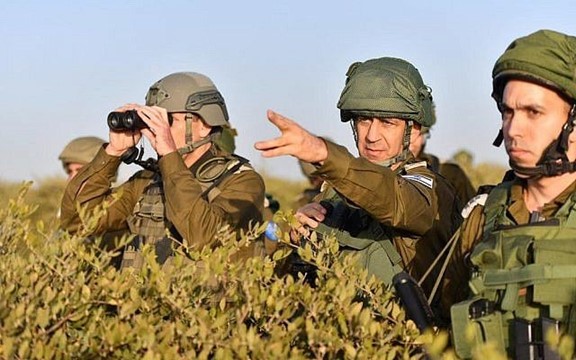 „IDF chief Aviv Kochavi visits Southern Command in undated photograph. (Credit: Israel Defense Forces)
„IDF chief Aviv Kochavi visits Southern Command in undated photograph. (Credit: Israel Defense Forces)
„It is early morning in the Negev desert, a battalion of soldiers crawls across the desert sand with assault rifles cocked. It’s a routine military exercise, but these are no ordinary combatants – they are Arabs who have voluntarily chosen to fight and even sacrifice their lives in order to protect the State of Israel. These young men, and some women too, are proud to be part of the Israel Defense Forces (IDF). One of these young men is sergeant Emad, who proudly says 'It’s an honor, to hold in one arm the assault rifle and on the other arm the holy Koran, to defend my homeland, Israel’
„There is a massive misconception in the mainstream media about the Israeli Army. Most people believe it’s predominately Jewish, and it was at its early inception… [But] the IDF has changed greatly in the decades since it was born. Today, the IDF represents the whole nation, 'the people’s army,’ in which Israeli Jews, Druze, Muslims, Arabs, Bedouins and Christians all are brothers in arms.
„Druze – IDF’s Highest Enlistment in Entire Israel
„The Druze, an Arabic-speaking minority of about 150,000, roughly 2% of Israel’s population, mostly live in the northern regions of the Galilee, Carmel and the Golan Heights.
„In 1956, Druze leaders signed a 'covenant of blood’ with the Israeli government, conscripting the community into the IDF making it as the only non-Jewish minority serving, though Druze women are exempt. Serving at the IDF has ever since been part of Druze identity and source of pride, love and loyalty to Israel.
„In fact, above 80% percent of Druze men enlist in the IDF, the highest enlistment percentage of all communities and sectors of Israeli society, including Israeli Jews.
„Tawfiq from Qalansum, in northern Israel tells Al-Majalla, 'I was youngster when I enlisted, I was looking for a proper career and IDF offers so many development opportunities. Early in my service I was attached to a battalion in which most of the guys didn’t know much about the Druze, their culture and history. And here, I had the opportunity to teach them about my community. I see Israel as our homeland, it is a tiny state in the Middle East, and we are all obliged to defend it. Defending Israel was the main reason why I joined and stayed in the IDF for 25 years. Any Druze citizen you may come across will tell you that they are proudly patriotic and will share with you the love they feel towards this land. During my service I was never treated differently than my Jewish Israeli fellow-soldiers. On the contrary IDF is one of the few institutions where everyone is treated equally and fairly. Most IDF teams would have a mix of Jews, Muslims, Christians, and Bedouins. We were all equal, and career progression was based on one’s potential and merits and not if he is Jewish or not.’
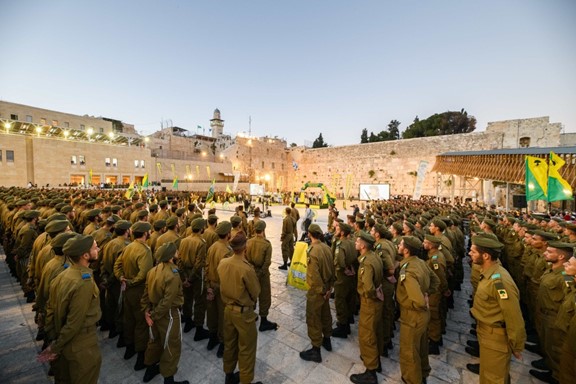 Arab troops during basic training. (Credit: IDF Spokesperson’s Unit)
Arab troops during basic training. (Credit: IDF Spokesperson’s Unit)
„Dr Anan Wahabi served in the IDF for 30 years. Today, among other things, he teaches at the International Institute for Counter Terrorism in Herzliya. He says, 'The IDF, for me on a personal level, was the institution that took me out from my village and helped me progress on the career ladder and become the person I am today. I am from the sixties generation, my generation grow up with two flags: the Druze and the Israeli one, they both are part of my identity and I am proud to wave both of them. Tell me, where in the Middle East is there a minority in the national army that is allowed to be proud of its ethnicity and wave its flag? The Israeli flag, is my flag and I fought in many wars defending what this flag stands for.’
„The Arab Society in Israel
„In 1957, the Israeli government designated the Druze as a distinct ethnic community separate from Palestinian Muslims and Christians who live inside Israel. The Arab citizens of Israel, also known as Israeli Arabs, among whom are those who call themselves Palestinian citizens of Israel, are descendants of the 160,000 Palestinians who remained in their towns and villages after the State of Israel declared independence in 1948. Arab citizens of Israel represent one-fifth of the total population and they form the overwhelming majority of Israel’s 20% percent non-Jewish demographic.
„Israel has a population of about 10 million – of those 74.3% identify as Jewish, followed by Muslim about 17.9%, Christian 1.9%, the Druze roughly 2% and some other religions under 4%, e.g., followers of the Bahai faith.
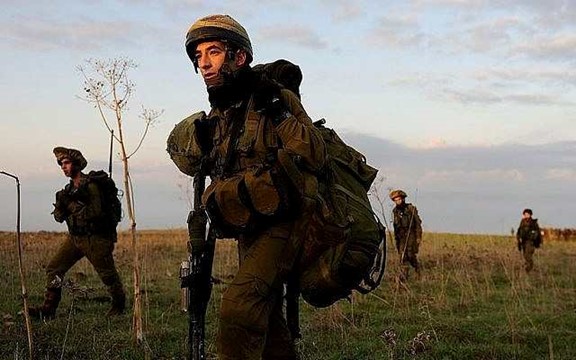
„Like the Druze and other minorities living in Israel, they possess the same rights as Jewish Israelis under the law. Israeli Arabs are integrated in the Israeli workforce and represented in every sector of the society including the highest political echelons and in the Israeli Defense Forces.
„Despite the fact that Israeli law does not force Israel’s Arab Muslims, Christians or Bedouins to join the IDF, the past few years have seen a sharp and steady increase of young men and women from Israel’s Arab society joining the IDF in great numbers compared to a decade ago.
„President Isaac Herzog: 'You Are Our True Pride. I Salute You’
„Those Al-Majalla spoke with expressed that their sense of belonging and loyalty to state of Israel is what made them join the IDF. 'Why did I decide to enlist?’ asks Sergeant Sami Heib, a 20-year-old Bedouin who is been with the IDF over two years, 'Because this is my homeland, I am part of this country and I want to contribute.’ He continued, saying that 'many relatives of mine already serving in the IDF and my parents support my decision and are very proud of me.’ He told Al Majalla that the IDF made him feel at home, 'the fact I am come from a minority group is probably the reason why the IDF is treating me more special, because they want me to feel that I belong here.’
„This year, on 5 May, 2022, President Isaac Herzog hosted the annual Independence Day Ceremony at his official residence. Among the VIP guests were Prime Minister Naftali Bennet, Minister of Defense Benny Gantz and IDF Chief of Staff Aviv Kochavi. The ceremony was to honor and hand out 'Commendations of Excellence Service’ to 120 IDF soldiers and officers from a diverse set of units in the military. To the 120 soldiers and officers, President Herzog said 'You are our true pride. I salute you. I have read your stories. I was moved by your stories. Truly, by each and every one. You are here thanks to who you are, and thanks to who we are — thanks to you! Thank you very much! I extend the same gratitude to you, dear parents and families. We are proud of your children, and we are excited together with you.’
„A number of Israeli Arab officers were among those who received 'Commendations of Excellence Service.’ One of them is Anas Safedi, 'I was brought up on Islamic values, and those values taught me that loyalty towards one’s homeland is sacred and an obligation. This why I carry my weapon to defend Israel.’
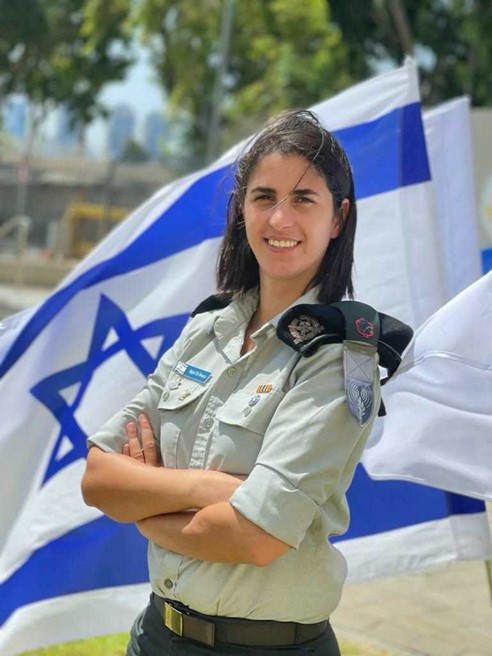
„Ella Waweya and the making of the impossible possible
„Ella’s story is an extraordinary one – she was born in 1989 in the Israeli Arab town of Qalansawe, a few miles from the city of Netanya. She joined the IDF in 2013 and completed her training as an exemplary soldier and participated in many operations. In 2015 she received the President’s Outstanding Medal. In September 2021 Ella was promoted to the rank of Major in the Israel Defense Forces and became the first Arab Muslim woman to attain this rank.
„Al-Majalla met up with Ella in the city of Tel Aviv. The first thing one noticed, is how proud she is of her multi-identity as a woman, Arab, Israeli and Muslim, and proudly bears her rank in the army. It could not have been easy for a young Arab girl to go against the norms of familial and societal expectations of what women can and can’t do, and on the top of that joining an army that often portrayed extremely negatively in Arabic media and circles.
Ella Waweya. (Wikimedia Commons)
„She tells us that 'For the first 18 months, I kept it secret that I joined the army, but during home leave on a weekend my mother came into my room without knocking and found my IDF uniform. She looked at the uniform, turned her gaze to me and began to cry, but quietly so that no would hear her.’ Eventually, when it became known in her hometown that she works for the IDF, Ella was to become subject to negative reactions with some people choosing to distance themselves from her. But this brave confident woman took it all in stride.
„It took Ella’s father almost a year and half to forgive her for joining the IDF. But eventually he accepted her choice, and he was proudly telling people that his daughter is in the army. Sadly, her father died of coronavirus before getting the chance to see his daughter becoming the first Arab woman IDF Major. Her mother attended the ceremony when Ella got her major’s bar. 'I am proud of her, of course. My daughter, praise be to God, did nothing wrong … she built herself with her own hands,’ her mother said.
„Today, Ella is the Deputy Head of the IDF’s Arab Communications Department, her target audience is the hundreds of millions of Arabic speakers in the Middle East and around world. To Arabic social media surfers, she is known as 'Captain Ella,’ the face and voice of the Israel Defense Forces.
„Since late 2019, Ella no longer holds back from telling the whole world that she works for the IDF, 'The Israeli flag gives me a sense of excitement, belonging and love,’ she proudly says.
„There are thousands of people like Ella, officers and soldiers who are proud of working for the IDF. Three decades ago, it was almost impossible for an Israeli Arab to even consider enlisting. A decade later, many of those Israeli Arabs who joined the army were afraid to reveal their IDF service publicly. However, times have changed and many young Israeli Arabs now see themselves more broadly and are proud to say 'I am an Arab and an Israeli.’
„’What are people looking for? Equality between an Arab and a Jew, a Bedouin, a Druze and a Christian. The path to equality passes through the IDF, the Ministry of Defense, and the police. That’s how its starts,’ said Ella.
„Recently, the Israeli Police released its recruitment report and it showed that more than 20% of the newly enlisted in the Israeli police force in the past year are Muslims and Bedouins.
„The IDF and its Well-structured Recruitment Approach
„Statistics provided by a 'Senior IDF Official from the Manpower Directorate’ to Al-Majalla, show the number of Arab Israeli draftees has been on the rise for the past few [years]. This Senior Official (not authorized to reveal his name) says he heads a unit that is in charge of the inclusion of minorities and different populations in the IDF. He says 'our unit doesn’t just deal with recruitment but also is responsible for liaising between the military and the minority groups who serve in it. We ensure that each recruit is supported in terms of wellbeing and given the same professional progression like any other new enlistee.’
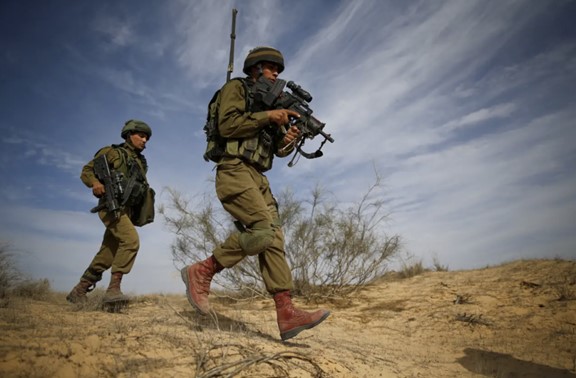 „Yussef Saluta, 20, an Israeli Arab soldier from the Desert Reconnaissance battalion takes part in a drill near Kissufim in southern Israel November 29, 2016. (Reuters)
„Yussef Saluta, 20, an Israeli Arab soldier from the Desert Reconnaissance battalion takes part in a drill near Kissufim in southern Israel November 29, 2016. (Reuters)
„The unit is divided into four-sub sections/divisions with each section dealing with enlistees from Israel’s Arab minority groups: Bedouins in the South; Bedouins in the North; and, Christians and Muslims living in villages and towns. He says 'our mission is to enlist as many Israeli Arabs as we can.’
„He says that over the past few years the IDF has seen a sharp rise in the number of Israeli Arabs volunteering to serve in the IDF. But he explains the numbers are higher in some sub-divisions then others. Within the Christian-sector the IDF is annually managing to recruit between 130-150 soldiers; Bedouins from the South roughly about 150 a year; Bedouins from the North between 300-350. In regards to 'other’ Muslims, he says 'it’s quite hard to pin an exact figure, because like the Bedouins, they are Muslims too. But through our contact with schools and community centers we are recruiting about 40-100 soldiers from various Muslims towns and villages.’
„However, he does point out that the numbers are not a 100% exact as in some periods the number of new recruits is average and in other periods they sharply go up. One of these periods, had a monumental upsurge during the coronavirus outbreak.
„The coronavirus crisis did play a significant role to help the IDF to gain more recruits and the army was to be perceived differently by the Arab public in Israel. He explains why: 'During the pandemic, IDF soldiers were deployed to deliver food and medicine to elderly and sick people. They took part in the coronavirus awareness campaigns and later helped with setting up vaccine centers and so on. The IDF efforts were greatly appreciated by the Muslim citizens living in those villagers and towns. You can say the fear factor was broken, as people were able to see with their own eyes how tirelessly the IDF was working to look after all residents of Israel.’
„When asked about why the IDF recruitment for Bedouin in the North is much more successful in comparison with the recruitment drives of Israeli Christians or Muslims, he explains that 'the people who live in northern Israel are more accustomed or open to the IDF. You see, every family, they would either have a son, a brother, a husband, an uncle, a relative or a next-door neighbor who is already serving in the IDF.’ He adds 'that Bedouin towns and villages in the north are modern and the number of people in higher education is greater than the South (Negev area). So we are getting volunteers who are educated and wish to pursue a career in the IDF or use the IDF as a pathway to later get a job with other law enforcement agencies, like the border police. The Bedouin youngsters in the south are not as open minded like the ones we see from the north.’
„About 75% of Bedouin IDF soldiers come from the north. The low rate of the recruits from the South, might be also connected to the time-to-time tension between authorities and the government, e.g., illegal building expansions which often result in a governmental order of demolition, crime, and the increased political strength of radical Islamists among other factors.
„The army believes that the significant increase in the number of enlisted Muslims (which is primarily among the Bedouin population) is related to a large recruitment campaign and personal invitations that were sent to thousands of young people to enlist in the army.
„The 'Senior IDF Official from the Manpower Directorate’ also says 'that times have changed, young Israeli Arabs are more aware of what the IDF is and what it can offer them in terms of career opportunities within the army itself or further education [in] post-army life. People want to join the army to better their circumstances and at the same time they want to contribute and strengthen the security of their country, Israel.’
„The IDF and the Defense Ministry are planning to soon host a large recruitment drive, sending thousands of invitation letters to young members of the Bedouin community, also reaching them via Instagram and various social media platforms instead of standard recruitment notices in community centers. At the same time, Bedouin reserve soldiers will take part in additional activities that are part of the campaign.
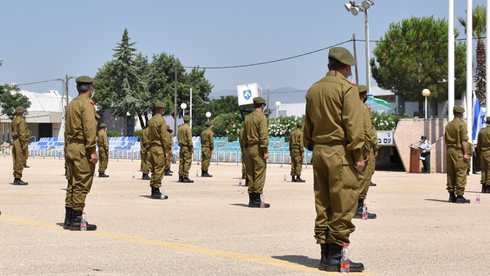 „Israeli Arab troops During basic training. (Credit: IDF Spokesperson’s Unit)
„Israeli Arab troops During basic training. (Credit: IDF Spokesperson’s Unit)
„Besides the increase in the number of Israeli Arabs who have been drafted into the IDF, the number of Israeli Arabs soldiers who left the service early shrank by 7%. In 2019, the drop-out rate was 30%, as opposed to 23% in 2021. The IDF’s goal for the coming year is to get the number down to 20%. In addition, in the past year, there was also a 10% decrease in the amount of time Muslim soldiers were away from their service without authorized leave. IDF officials believe that all the statistics indicate a high motivation to continue to serve.
„’Serving the Occupation’
„Enlisting is still controversial in some Arab communities in Israel and there are those who have voiced their anger and concerns. They claim among other things that the enlisting of Israeli Arabs is a 'politically motivated,’ and that the IDF is aiming to divide the Arabs of Israel.
„One of those critics of the enlistment drives is Hanin Zoabie, a [former] Arab Israeli Knesset Member. She claims that 'Israel is after people to serve in the army who are poor and have no work.’ Zoabie continued, saying, 'Ninety percent of the Arabs who serve in the Israeli army don’t have equality with Israelis. Israel does not need them to protect its security, it’s a political issue – first to divide and rule.’
„Al-Majalla has asked Mr. Hassan Kaabia to comment on MK Zoabie’s assertion. Kaabia is an Israeli Arab and a former Lieutenant Colonel who served in the IDF for over two decades and currently works as the spokesman for the Israeli Ministry of Foreign Affairs. This is what he had to say – 'The IDF is the only institution where there is no discrimination and there is total equality and inclusion. It is not true that they are joining because of economic factors. The majority of Israeli Arabs who join the army are doing it because of one reason and that is they want to be part of the state. They want to integrate in the civil society and also get better career opportunities, as most companies prefer candidates who done their military service.’ Kaabia adds that 'Zoabi has a political agenda that has resulted in some not wanting to be integrated in the Israeli society. But it’s fine for her to work in the Parliament and get a very high salary from the government of Israel, who also pays for her car, office and so on.’
„Mr Kaabia’s son, Captain Asaf, decided to follow in his father’s footsteps and joined the IDF a few years ago. MK Zoabi’s argument of only 'poor men with no jobs’ is getting even thinner when you consider that Mohammed Zoabi, her very close relative, joined the IDF.
„Al-Majalla also asked the 'Senior IDF Official from the Manpower Directorate’ to comment on MK Zoabi. His reply 'listen, I say we are not holding a stick and forcing people to join. We have enough soldiers in the IDF who are more than capable to protect Israel. Israel is for all Israelis – Jews, Muslims, Bedouins, Christians, Druze and so on. The IDF is here to serve all the people of Israel. We see the IDF as a home, a family where everyone should made to feel welcomed and included. Israel is a multi-faith and cultural society with many minorities. The IDF can be a great platform to connect all of to us to our homeland, Israel.'”
[1] Eng.majalla.com, July 8, 2022.








